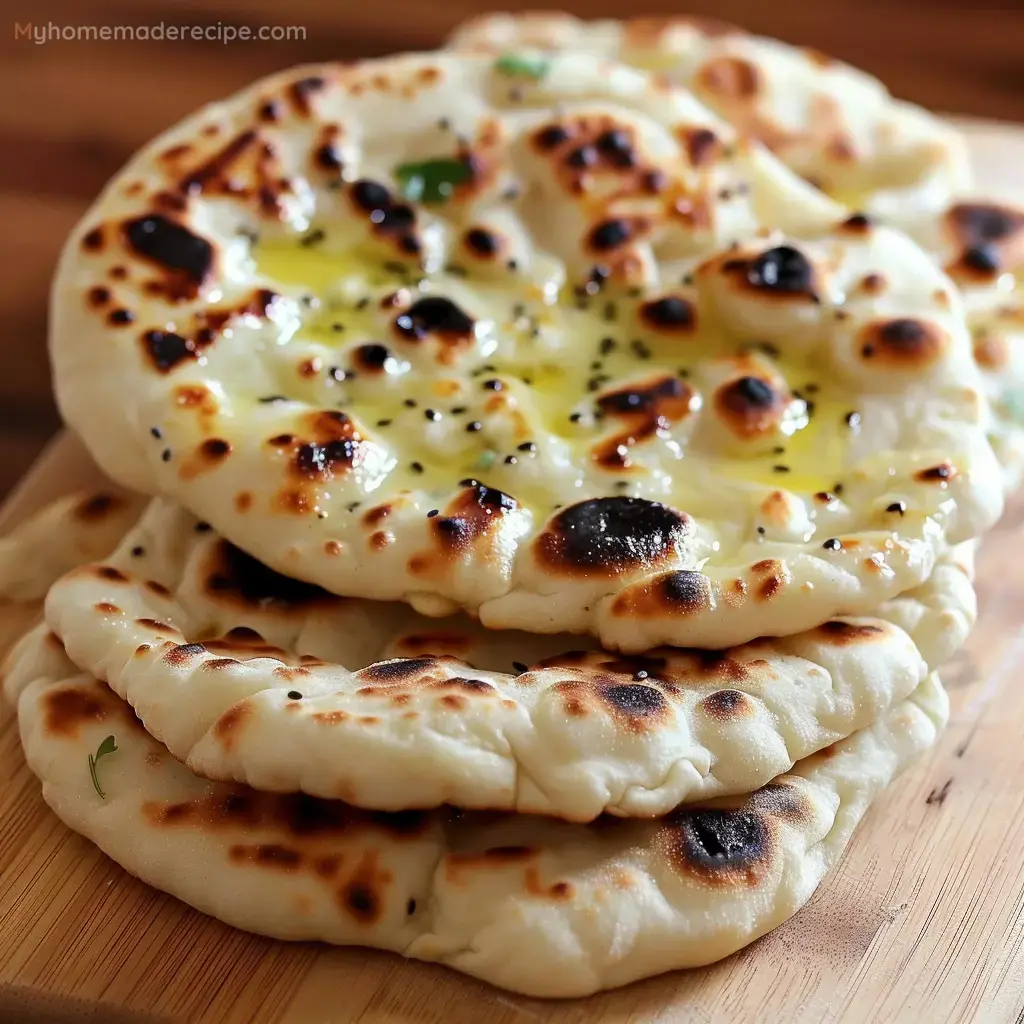 Pin it
Pin it
INGREDIENTS
- All-Purpose Flour: 2 1/4 cups, plus extra for dusting. Forms the base of the dough.
- Baking Powder: 1/2 teaspoon. Helps the dough rise.
- Baking Soda: 1/2 teaspoon. Works with the baking powder to leaven the bread.
- Salt: 1/2 teaspoon. Enhances the flavor of the bread.
- Sugar: 2 teaspoons. Adds a hint of sweetness and helps with browning.
- Plain Yogurt: 1/4 cup. Adds moisture and a slight tang to the dough.
- Warm Milk: 1/2 cup. Helps to activate the baking powder and soda.
- Olive Oil: 1 tablespoon, plus extra for greasing. Adds richness to the dough.
- Butter or Ghee: For brushing (optional). Adds a rich, buttery flavor.
- Garlic, Chopped Cilantro, or Sesame Seeds: For topping (optional). Adds extra flavor and texture.
INSTRUCTIONS
- Step 1:
- Combine Dry Ingredients: In a large mixing bowl, combine the all-purpose flour, baking powder, baking soda, salt, and sugar. This step ensures that the dry ingredients are evenly distributed throughout the dough.
- Step 2:
- Add Wet Ingredients: Make a well in the center of the dry ingredients and add the plain yogurt, warm milk, and olive oil. Mix until a dough forms. This step combines the wet and dry ingredients to form a cohesive dough.
- Step 3:
- Knead the Dough: Knead the dough on a floured surface for about 5 minutes, or until it becomes smooth and elastic. This step develops the gluten in the dough, giving it structure and chewiness.
- Step 4:
- Let the Dough Rise: Place the dough in a greased bowl, cover with a damp cloth, and let it rest in a warm place for 1-2 hours, or until it doubles in size. This step allows the dough to rise and develop flavor.
- Step 5:
- Preheat the Skillet: Preheat a skillet or griddle over medium-high heat. This step ensures that the cooking surface is hot enough to properly cook the naan.
- Step 6:
- Divide the Dough: Divide the dough into 6 equal portions and roll each portion into a ball. This step prepares the dough for rolling and cooking.
- Step 7:
- Roll Out the Dough: Roll out each ball into a thin oval or round shape, about 1/4 inch thick. This step shapes the naan for cooking.
- Step 8:
- Cook the Naan: Cook the naan bread on the skillet or griddle for 1-2 minutes on each side, or until golden brown and puffed up. This step cooks the naan, giving it a delicious, slightly charred flavor.
- Step 9:
- Add Toppings: Brush with butter or ghee and sprinkle with chopped garlic, cilantro, or sesame seeds, if desired. This step adds extra flavor and richness to the naan.
- Step 10:
- Serve: Serve warm and enjoy with your favorite curries or dips. This step ensures the naan is enjoyed at its best.
Serving and Storage Tips
- Serve Warm: Naan is best served warm, straight from the skillet, to enjoy its soft and fluffy texture.
- Pair with Dishes: This naan pairs perfectly with curries, stews, and dips like hummus or tzatziki. It also makes a great base for wraps and sandwiches.
- Customize Toppings: Enhance the flavor of your naan by brushing with melted butter or ghee and sprinkling with chopped garlic, cilantro, or sesame seeds.
Storage Tips
- Refrigerate Leftovers: Store any leftover naan in an airtight container in the refrigerator for up to 3 days.
- Reheat Properly: To reheat, warm the naan in a skillet over medium heat or in the oven at 350°F until heated through. You can also microwave for a few seconds, but this may make the naan less crispy.
- Freeze for Longer Storage: For longer storage, you can freeze the cooked naan. Wrap each piece in plastic wrap and store in a freezer-safe bag for up to 2 months. Reheat in the oven directly from frozen at 375°F until warm.
- Avoid Overheating: Be careful not to overheat the naan when reheating, as this can make it dry and tough.
Helpful Notes
- Use Fresh Ingredients: For the best flavor and texture, use fresh yogurt and milk.
- Adjust Thickness: Roll the dough to your desired thickness. Thicker naan will be softer and chewier, while thinner naan will be crisper.
- Experiment with Flavors: Try adding different herbs and spices to the dough or toppings, such as cumin seeds, nigella seeds, or chopped fresh herbs.
Tips from Well-Known Chefs
- Chef Madhur Jaffrey recommends letting the dough rest for a bit longer for a softer texture.
- Chef Sanjeev Kapoor suggests using a cast iron skillet for an even heat distribution and better flavor.
- Chef Jamie Oliver advises experimenting with different toppings to find your favorite combination.
